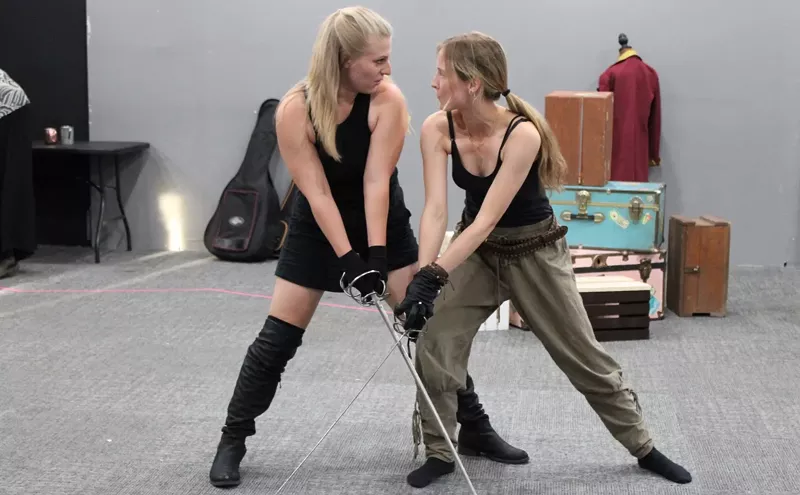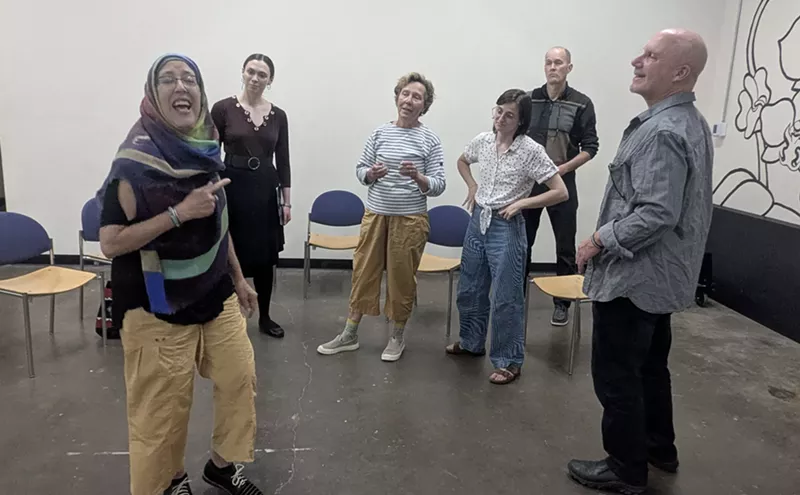Now I Lay Me Down to Sleep tackles health, care, death and dying in the United States, and finding material should be easy. Is there anyone — beside those who profit from it — who is happy with our country's medical system? Is there anyone who hasn't experienced some level of personal crisis, watched at a death bed or attended the funeral of someone they loved? But the very vastness of the subject, its prevalence in our culture in every shape, from memoir to music to Hollywood movie, is a stumbling block. How do you make art out of all this? How do you say something that hasn't already been said before by talents of every size and kind and in every form, from the weepie film Love Story to Joan Didion's The Year of Magical Thinking, from newspaper stories about people denied urgent care to surgeon Sherwin Nuland's seminal exploration How We Die? The response of LIDA's Brian Freeland is six plays, created collaboratively by a group of actors and directors: The Immigrant, The Survivor, The Patient, The Addict, The Middleman and The Soldier. Each takes a piece of the puzzle; each is complete in itself. The intention is to create some kind of revelatory whole.
Although the seventeen-year-old company has just moved to a new space at 27th and Larimer, Freeland dispenses with the regular theater environment (even one as flexible and informal as LIDA's) to stage these plays — two on any given weekend night — in private homes around town. On the evening I attended, a lively young audience was settled in a comfortable living room on straight-back chairs, a deep armchair, a cozy sofa. A strange mix of sounds began percolating from above: groans, sighs, muffled exclamations of irritation or self-pity. A troupe of grotesquely masked people shambled down the stairs and began pushing their way through us toward the playing space, squeezing between our chairs, turning back in disgust, trying again, shoving and bumping, stumbling over each other.
The story they told had to do with the way that soulless calculations of insurance companies — apparently in collusion with the state — force citizens to choose between life and death. It seems to be some time in the future, but not very removed from today's reality. The telling is both bitter and funny, with big, stylized movements, interesting use of objects both visible and invisible, and the exaggeratedly comic masks often telling a story separate from the one emerging from the actors' mouths. The insurance company administrator, for example, maintains her fixed, flaky and cartoon-sweet expression, even while her words emerge flat and reproving. The tilt of the pregnant woman's pointed face, her long upturned nose and narrow eyes often speak a different language from the one coming out of her mouth. There is also a masked chorus of three to circle, gesticulate and semi-chant the kind of horror stories we've all become far too familiar with. You can't quite catch these in their entirety, but familiar words emerge to hang in the air: leukemia, money, transplant, died.
The strength of The Middleman doesn't really lie in the script, however, which tells us little we don't already know. It's in the use of masks — designed by director Robin Davies — and movement, and also in the intimacy of the environment. The players' struggle to get through too-small spaces tells you everything you need to know about the anguish of trying to find your way through the system, and the way it entraps you. The pregnancy is shown as both hilarious and unsettling. The pregnant woman fondles her swelling belly the way all mothers-to-be do, but we're well aware that this bump isn't caused by anything animate. The huge staggering backbends and stomach thrusts she goes through when she tries to sit down are as recognizable as they are comic. And when I felt that hard belly pushing against me as the play ended and the actress again forced her way through our chairs, I didn't know whether to push back or worry about the hypothetical baby — and that sense of claustrophobic involvement was a testament to the effectiveness of the space. The audience stayed after the play, and a dozen conversations started up, as everyone shared illness and health-care stories.
I can't know exactly how The Middleman fits into the entire work, but it's worth finding out.












